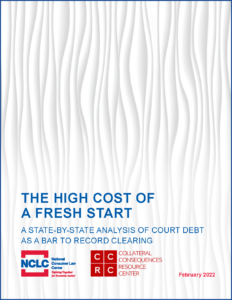- Report
- Executive Summary
- Appendix: Court Debt as a Barrier to Clearing a Conviction Record
- Graphics
- Press Release
Published February 14, 2022
©National Consumer Law Center, Inc.
Overview
This report explores the extent to which restricting access to record clearing based on outstanding criminal fines, fees, costs, and restitution—collectively known as “court debt”—may prevent poor and low-income people from getting a second chance. After surveying research on the importance of record clearing and the mushrooming financial burdens imposed on criminal defendants, it analyzes the extent to which outstanding court debt is a barrier to record clearing under the laws of each of the 50 states, the District of Columbia, and the federal system. Our study focuses in particular on generally applicable statutory authorities for clearing adult criminal convictions; it excludes record-clearing authorities available for other categories of records (e.g., non-conviction records) or for specific categories of individuals (e.g., victims of human trafficking).
Key Recommendations
Based on our research, we offer the following recommendations:
- Court debt should never be a barrier to record clearing: Qualification for record clearance should not be conditioned on payment of court debt, and outstanding court debt should not be a basis for denying relief, regardless of whether record clearing is petition-based or automatic. (Whether states should waive outstanding court debt at the time of record clearing is a separate policy issue that is beyond the scope of this report.)
- Application-related costs, including filing fees, should never be a barrier to record clearing: States should adopt automatic record-clearing processes that do not require individuals to incur costs to have their records cleared. States with petition-based record clearing should not require people seeking relief to pay any filing fees or other costs to submit a petition or to obtain or effectuate relief.
- Jurisdictions should collect and report data on monetary barriers to record clearing: Jurisdictions where record clearing may be denied on the basis of outstanding court debt should collect and report data reflecting the
impact of these barriers on record clearing. Jurisdictions should also collect data reflecting the impact of filing fees and other application-related costs on obtaining relief.
Related Resources
- NCLC’s Work on Criminal Justice Debt
- Collecting Criminal Justice Debt Through the State Civil Justice System: a Primer for Advocates & Policymakers, May 2021
- What States Can Do: Criminal Justice Debt
- Broken Records Redux: How Errors by Criminal Background Check Companies Continue to Harm Consumers Seeking Jobs and Housing, Dec. 2019
- Criminal Justice Debt in the South: A Primer for the Southern Partnership to Reduce Debt, Dec. 2018

